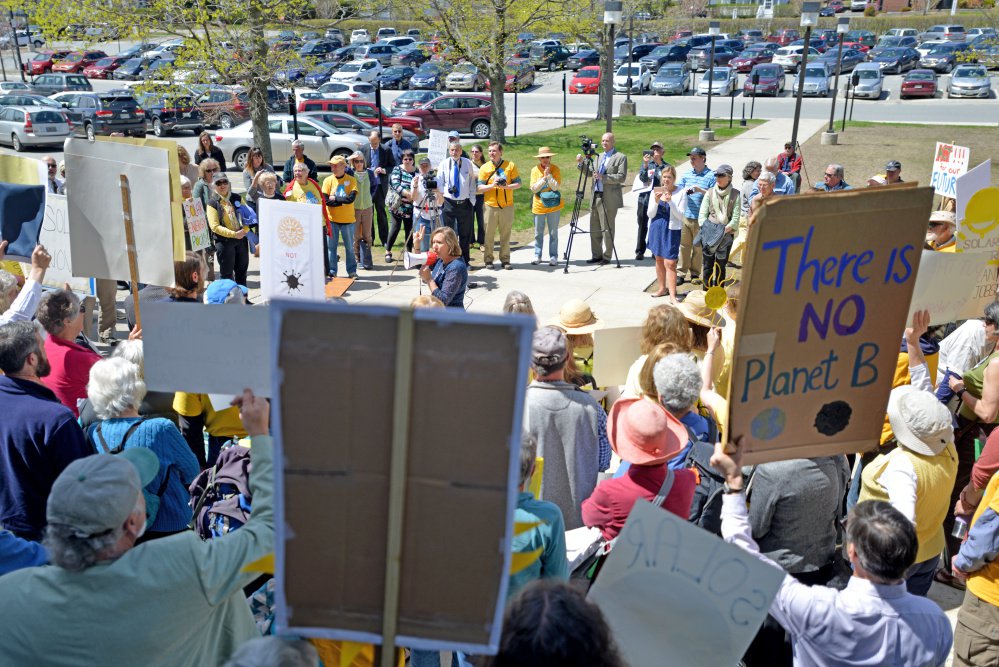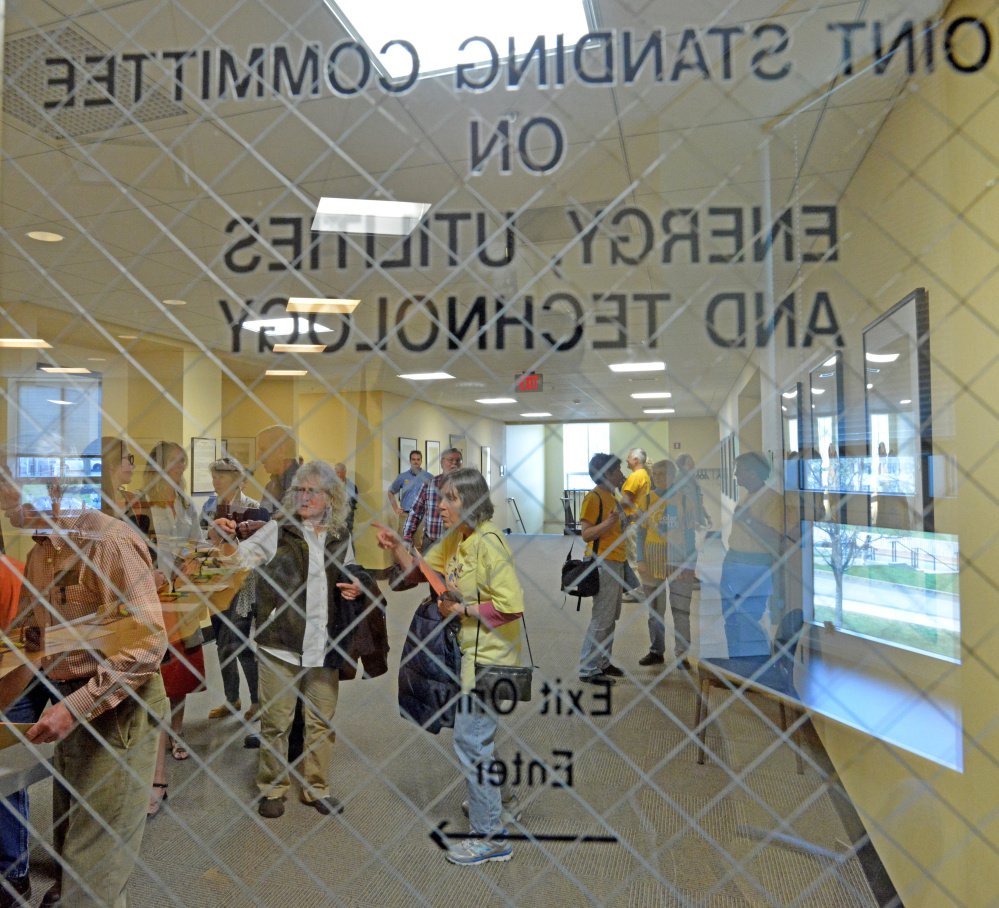AUGUSTA — Clean-energy advocates and their supporters rallied Thursday around legislation aimed at maintaining and expanding financial incentives for rooftop solar electricity.
But while the proposal was praised by dozens of residents, businesses and town officials at a public hearing, it seems destined, in its current form, to face significant resistance in the Legislature, centering on the impact of solar incentives on customer bills.
Formidable opponents said the bill will raise electric rates, including Gov. Paul LePage and Central Maine Power Co.
Also weighing in was the chairman of the Maine Public Utilities Commission, Mark Vannoy. Although stating that his agency was neutral on the bill, Vannoy provided damning testimony about its impact on ratepayers, calculating that net metering last year shifted $1.8 million onto non-solar customers served by CMP, and that proposed solar rebates would add $2 million to that in their first year.
Supporters, meanwhile, have calculated that the incentive would add a nickel per month to a typical home electric bill. And they said the rebates contemplated in the legislation, aimed at encouraging more solar installations, would add $1.30 a year to a typical bill at first, falling to 60 cents a year at the end of the program.
In upcoming work sessions, lawmakers will have to decipher these competing and confusing estimates.
The measure specifically seeks to protect net-energy billing, often called net metering, which compensates homeowners and small businesses at the full retail rate for power they generate. It would supersede a broadly criticized rule approved in January by the PUC that would gradually reduce that compensation beginning in 2018. Solar installers say the rollback and other elements of the PUC’s rule would cripple their industry and stunt the kind of job growth here that is taking place in other states.
In a broader, political sense, the bill also will be a litmus test, according to its prime sponsor, Rep. Seth Berry, D-Bowdoinham.
Last year, a comprehensive solar bill that featured a different approach to net metering died after lawmakers failed to override the governor’s veto by two votes. LePage is a strident critic of net metering, saying it unfairly shifts the cost of solar installations to all electricity customers
Berry, who co-chairs the committee that handles energy matters and will make recommendations to the full Legislature, said before the public hearing that lawmakers will have to take a stand: for clean, locally produced energy, or for out-of-state fossil fuels.
“I believe that in future elections,” he said, “this Legislature will be judged on whether it allowed the PUC’s extreme decision to stand, or whether it took steps to move Maine forward to control our own energy destiny.”
But Rep. Beth O’Connor, R-Berwick, a member of the committee known for her conservative fiscal outlook, said she’s not aware of support from House Republicans for this approach.
“I’m going to look at it fairly,” she said. “I do think it’s responsible to keep net metering, but it should never, never, cost ratepayers money.”
In the background of Thursday’s hearing was a notice of appeal with the Maine Supreme Judicial Court, filed Monday by environmental groups. If lawmakers don’t supersede the PUC action, the Conservation Law Foundation said it’s ready to challenge the rule on legal grounds.
But Berry said it was the role of the Legislature to set policy, not utility regulators and environmental lawyers.
“We can create jobs for lawyers, or we can create jobs for working people,” he said.
Berry’s bill is among a handful of other efforts this session meant to advance the use of solar power. But this one is getting the hardest push from environmental groups that include the Natural Resources Council of Maine and the Maine Chapter of the Sierra Club. They held a well-attended rally outside the Cross Office Building before the hearing, hoping to get their members to put pressure on legislators to support solar.
At the hearing, lawmakers heard from a car repair business in South Paris powered by solar panels, a city planner from Belfast, where net metering has helped put up panels to offset municipal costs, and homeowners anxious about the future of net metering.
Compelling testimony came from Kelly Fairfield, who stood before the committee with her sleeping 5-month-old daughter in a carrier. She and her husband are contemplating solar for a house they’re buying in Farmingdale, but uncertainty over net metering is giving them pause. Fairfield said she’s using cloth diapers for her baby, and would feel guilty not using sunshine to power their new home.
But opponents don’t see why other homeowners should help pay for Fairfield’s desire.
Both Angela Monroe, the governor’s acting energy director, and Joel Harrington, a spokesman for CMP, outlined how the number of solar customers has been ramping up quickly in recent years. If the pace continues and current electric rates hold steady, Monroe said, a flood of customers will be compensated at rates well above market costs.
For the legislative outcome on net metering rules to change this year, Democrats, Republicans and interest groups will need to reach a consensus. Based on Thursday’s testimony, that seems unlikely.
Berry’s bill would continue to let solar owners get a full, one-to-one credit on the distribution and supply portions of their electric bills. Those credits help homeowners recover the costs of solar-electric panels, which can average $10,000 or so. It also would restore a long-expired rebate program aimed at creating an additional incentive.
The rebates would total roughly $8 million, stepping down over time. For an average CMP residential bill of $70 a month, the rebate-related surcharge would add 9 cents in 2017 and 4 cents in 2022. Solar advocates say even that small cost would partially be offset by reducing the need for expensive power plants to meet peak demand on hot summer days.
Berry said this approach can help Maine move out of last place in New England, in terms of solar power use and jobs associated with installing and servicing the systems.
Tux Turkel can be contacted at 791-6462 or at
tturkel@pressherald.com
Twitter@TuxTurkel
Copy the Story LinkSend questions/comments to the editors.










Success. Please wait for the page to reload. If the page does not reload within 5 seconds, please refresh the page.
Enter your email and password to access comments.
Hi, to comment on stories you must . This profile is in addition to your subscription and website login.
Already have a commenting profile? .
Invalid username/password.
Please check your email to confirm and complete your registration.
Only subscribers are eligible to post comments. Please subscribe or login first for digital access. Here’s why.
Use the form below to reset your password. When you've submitted your account email, we will send an email with a reset code.